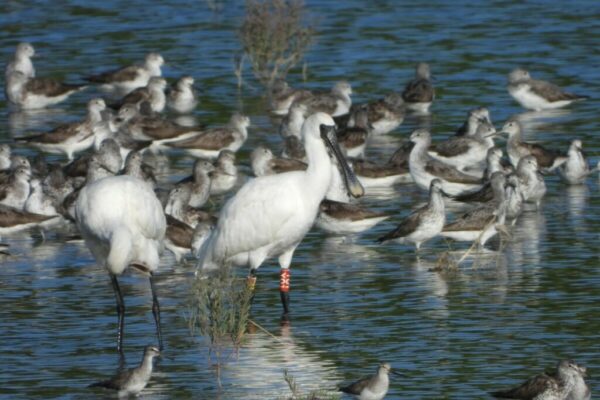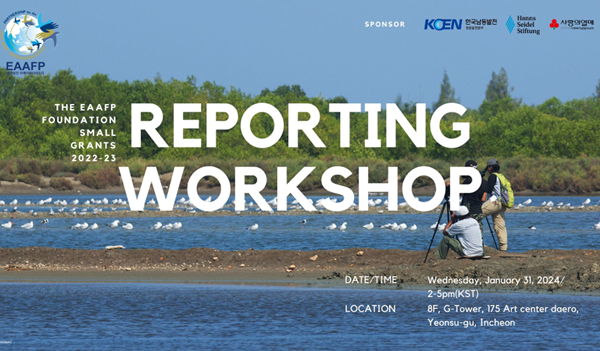
Following the launch of the Regional Flyway Initiative, on 10th November, a webinar “Discussing the East Asian Australasian Flyway Initiative” was organized by Cambridge Conservation Initiative (CCI) and BirdLife International. The webinar highlighted a briefing of the Regional Flyway Initiative, with a dialogue among Global Environment Facility (GEF), BirdLife International, Asian Development Bank (ADB) and EAAFP to discuss how the Initiative can contribute to the conservation and restoration of wetlands and migratory waterbirds while tackling climate change impacts.
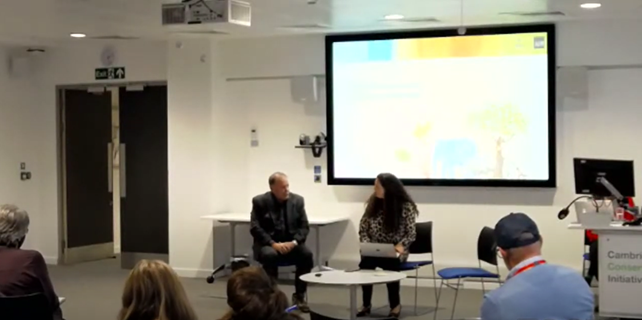 ©BirdLife International YouTube
©BirdLife International YouTube
The event was moderated by Patricia Zurita, CEO of BirdLife International, with Mr. Warren Evans, Special Project Facilitator at ADB, Mr. Carlos Manuel Rodriguez, CEO of Global Environment Facility, Ms. Yoon Lee, External Relations Manager at EAAFP Secretariat and on the panel.
The Regional Flyway Initiative (RFI), a long-term financing program to scale up the restoration of key wetland ecosystems and sustainable management in the East Asian- Australasian Flyway (EAA Flyway) was launched at the 15th Conference of the Parties of the Convention on Biological Diversity (CBD COP15) in Kunming, People’s Republic of China on 14th of October (here) and made its second launching at the United Nations Framework Convention on Climate Change (UNFCCC) 26th Conference of the Parties (COP26) on 2nd of November (here).
Ms. Patricia Zurita, CEO of BirdLife International opened the session by a briefing on the RFI and how it will benefit the livelihood of local communities and address the climate change impacts in our Flyway. She said, “When we give nature a chance, it comes back, and with it our livelihoods, jobs and our safety” Referring to the data of habitat conservation programmes in the United States, she pointed out that compared to forest and grassland, wetlands bounce back quickly. She stated that restoring and protecting these sites, it ensures biodiversity is protected and they will continue providing ecosystem services.
Mr. Warren Evans stated the Regional Flyway Initiative is a great opportunity to have a region-wide programme that focuses on biodiversity conservation, climate adaptation, mitigation, poverty reduction and livelihoods restoration. The scale is attractive to an institution like ADB. Financing for biodiversity conservation has been a challenge because many governments are not keen to invest in it, especially since many critical sites are small. This project provides an important opportunity.
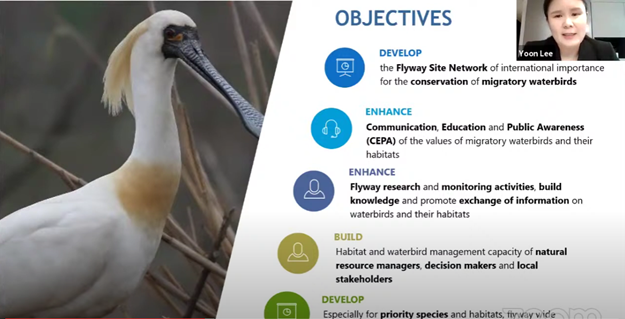 ©BirdLife International YouTube
©BirdLife International YouTube
Ms. Yoon Lee gave a presentation on behalf of EAAFP Secretariat. She introduced the mission of the EAAFP and talked about why the Regional Flyway Initiative is such an important and timely instrument for the EAAFP perspective. She stated “Regional Flyway Initiative brings us enormous opportunities for the flyway. One of the repeated messages coming from the UNFCCC COP26 is strengthening synergies between biodiversity convention and climate change convention. We have seen that the climate crisis and the erosion of biodiversity are closely interlinked. Maintaining important habitats for migratory waterbirds is a way to sustain carbon storage. We welcome this demonstrated will between GEF and GCF mentioned during the COP26 with a long-term vision and collaboration to tackle both issues. The RFI will be a key initiative to deliver on the ambition of the 18 countries and non-state partners under the EAAFP strategic plan 2019-2028. It will address sustainable delivery of ecosystem services and embrace the importance of achieving effective economic development outcomes for the communities that share important sites with migratory waterbirds.”
Mr. Carlos Manuel, as the head of GEF gave an insightful remark and shared his relevant experiences from his 30 years long career. He expressed how much he appreciated the inclusive dialogue at the COP26 with the biodiversity stakeholders such as CBD and BirdLife International. He stated that the climate community finally recognizes that nature should be in the center of climate action because nature provides us cost-effective solutions to whatever we want to do. He was delighted to hear people talking about eco-system-based adaptation and nature-based solutions. Climate change was the most important topic for the last decade and working with civil society who are indigenous people and have expertise on biodiversity is extremely important.
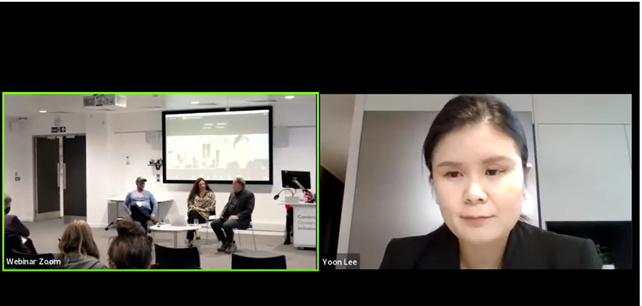 ©BirdLife International YouTube
©BirdLife International YouTube
A Q&A from audiences lasted for around 30 minutes. The 2 hour-long webinar closed by thanking the panelists for sharing their opinions and views.
What the webinar:
For more information on the Regional Flyway Initiative: [click here]

